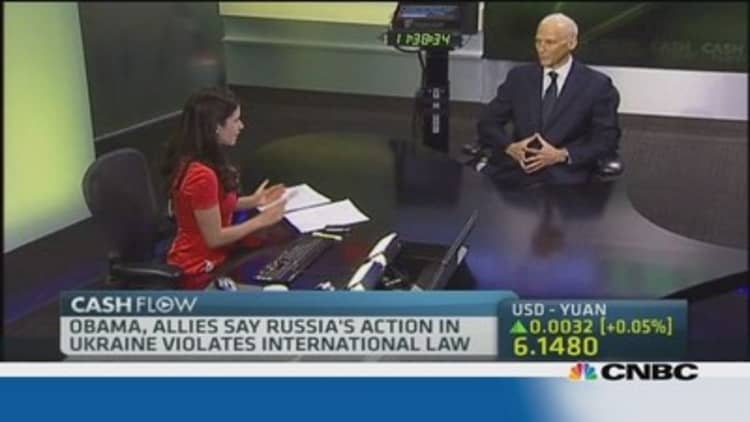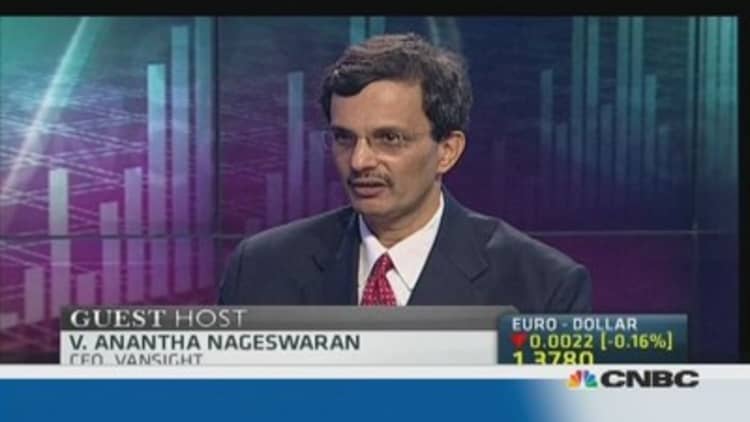Asian stock markets put on a dismal performance Monday, as brewing instability over Ukraine and weak official purchasing managers' index (PMI) figures from China sparked risk aversion among investors. Chinese shares, however, were the sole exception, trading in positive territory.
Ukraine mobilized for war on Sunday, calling up its reserves after Russian President Vladimir Putin threatened to invade in the biggest confrontation between Moscow and the West since the Cold War, Reuters reported on Sunday.
However, analysts see Ukraine's dampening impact on financial markets as short-lived. Jonathan Cavenagh, Senior FX Strategist at Westpac, told CNBC's Cash Flow, "I don't think the markets are going to take risk sentiment too far, at least until we have greater clarity in in Eastern Europe."
(Read more: Asian stocks may fall as Ukraine crisis deepens)
"Clearly, we've seen a risk-off tone in markets earlier on today but I think the market has seen enough reaction for now and the bigger issue for markets will be how the U.S. data unfolds, particularly the ISM survey tonight and payrolls report later this week. Those are bigger market movement events," he said.
Traders also digested China's latest PMI data. The official PMI, released Saturday, showed activity in the factory sector slowed to an 8-month low in February, reinforcing signs of a modest slowdown in the economy as demand weakens. The official PMI edged down to 50.2 in February from January's 50.5, just ahead of market expectations of 50.1.
The final reading from HSBC released on Monday showed China's factory activity fell to a seven-month low of 48.5 in February from 49.5 in January, marking the third straight monthly decline. However, the reading was above the flash reading for February of 48.3.
U.S. stocks were mixed on Friday. The Dow Jones Industrial Average and S&P 500 index rose 0.3 percent each, with the latter managing a record close. The Nasdaq shed 0.3 percent, after rising to a 14-year high of 4,342 intraday, on rumors about possible Russian action in the Ukraine.
Shanghai gains 1%
Mainland shares rose for a fourth consecutive session, outshining regional bourses despite successive weak factory data and ahead of the government's annual meeting due to start on Wednesday.
An easing of cash rates and a stabilization of the ahead of the National People's Congress may have soothed investors' concerns and propelled gains. The deputy governor of China's central bank said investors should not read too much into the yuan's recent volatility.
Defense stocks led the rally, after a knife attack at a railway station in Southwestern China left 33 dead on Saturday. Beijing Aerospace Changfeng surged 8 percent while Hafei Aviation climbed nearly 4 percent.

Underperforming the bourse were property stocks. China Merchants Property and Poly Real Estate plunged more than 1.5 percent each.
Speaking on the recent dismal showing in property shares, Tim Condon, Head of Research, Asia at ING Financial Markets told CNBC's Cash Flow, "I think (the property sector) will be the next source of anxiety. The authorities have a strong interest in making sure the property sector doesn't implode and they have the flexibility and policy instruments to prevent one but people will see these headlines and read the worst into them. Against this backdrop of slowing Chinese growth, its easy to make the case that this was the tipping point for China and this will be the hard landing year."
Tokyo tanks 1.3%
Japan's benchmark Nikkei hit a one-and-a-half-week low on Monday, as a double whammy of Ukraine tensions and a strengthening yen sent Japanese shares plunging.
Its currency had strengthened to trade at 101.3 against the greenback. Earlier in the session, it touched a one-and-a-half-week high of 101.22.
(Read more: The spotlight is on China, Ukraine this week)
"In the midterm, geopolitical tension in Ukraine should weigh on people's minds. Going forward, 14,000 will be a relatively firm bottom-line for the Nikkei and even if it falls below that, it's going to be very short-term, " said a senior trader at a foreign brokerage to Reuters.

Japan Aviation Electronics led losses with a slump of 5 percent. E-commerce firm Rakuten and index heavyweight Softbank tumbled 3 percent respectively.
Exporter stocks like Sony and Suzuki Motor lost over 1 percent each, hurt by a stronger yen.
Fast Retailing was one of the few to trade in the green on Monday. Shares of the retailer rebounded from a 0.4 percent loss to gain 1.3 percent, on news that it was in talks to buy U.S. apparel chain J. Crew.
(Read more: Japan Airlines CFO: Airbus was just 'better')
Sydney falls 0.4%
After posting its biggest one-day decline in a month to touch a two-week low of 5,350 earlier in the session, Australia's benchmark S&P ASX 200 index managed to trim some losses in late trading.
An uptick of 5.1 percent in job advertisements, the biggest increase in more than four years signalling that a pick-up in hiring may be in sight, could have lifted sentiment.

Blue-chip miners BHP Billiton lost 2.6 percent as it traded ex-dividend and rivals Rio Tinto and Whitehaven Coal dropped more than 1.5 percent respectively.
Banking stocks traded in the red all day with Macquarie Group taking the chunk of losses with a 1.7 percent decline.
Transpacific Industries capped the bourse's losses with a 0.5 percent gain after announcing it will sell its New Zealand waste management business to Beijing Capital Group.
(Read more: Is Australia's stock market getting lopsided?)
Gold stocks benefited from investors who bought into the safe-haven precious metal. Newcrest Mining surged 6 percent.
Meanwhile, the Australian dollar slipped to a one-month low as investors bid up safe haven currencies like the yen and on geopolitical tensions. The Aussie traded at 0.8888 against the greenback.
Seoul drops 0.8%
A downbeat mood shrouded South Korean shares which posted their worst daily fall in nearly a month on Monday.
Its currency similarly undertook a beating on Ukraine tensions and soft economic readings from China. The touched a one-week low to trade at 1070 against the greenback.
Blue-chip stocks weighed on the bourse; Samsung Electronics and Posco each saw a hefty loss of nearly 2 percent.
(Read more: Asia's biggest growth engines are in top gear)
Hogging headlines for the day was a Reuters report that North Korea fired two additional short-range missiles into the sea early Monday. This allowed defense stocks to outperform the lackluster bourse. Speco rose 0.7 percent while Victek added 0.2 percent.
Kia Motors also outperformed with a gain of over 1 percent, on news that its February sales went up by an annual 18 percent.
Meanwhile, South Korea's president nominated a former senior deputy chief of the central bank to be its next governor, with the mission of ensuring price stability in Asia's fourth-largest economy.
— Follow us on Twitter: @CNBCWorld

